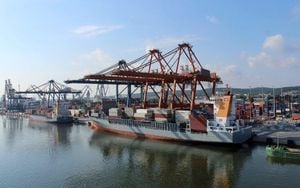German voters turned out on February 23, 2025, for federal elections expected to reshape the nation’s political future. With the highest participation rates anticipated, these elections follow the collapse of Chancellor Olaf Scholz's coalition government, bringing forth considerable competition from the Christian Democratic Union (CDU) and the far-right Alternative for Germany (AfD).
Polling stations opened early across Germany, enabling nearly 60 million voters to have their say, with the outcome determining the future direction of the country for the next four years. Reporters and political analysts described this election as one of the most captivating of recent decades, focusing on the battle between four primary candidates: Scholz from the Social Democratic Party (SPD), Friedrich Merz of the CDU, Green Party leader Robert Habeck, and Alice Weidel representing the AfD.
Early exit polls suggested the CDU would gain approximately 29% of the votes, ensuring Friedrich Merz likely emerges as the next Chancellor, succeeding the SPD’s Scholz, who was projected to secure merely 16-16.5%. More astonishing was the based performance of the AfD, which, according to projections, was on track to gain roughly 19.5-20% of the vote—the highest mark for any far-right party in Germany post-World War II.
Before the election, both Scholz and Merz urged their respective supporters to champion their causes, emphasizing themes of stability and international relations. "We need a strong European Union; otherwise, we won’t withstand numerous new powers on the world stage," emphasized Scholz, who has faced criticism for not showing satisfactory leadership during turbulent times marked by Donald Trump’s controversial foreign policies.
Merz, who promised stronger international standing for Germany, stated, "This election could be the most media-covered event ever witnessed. The world is watching—what will Germany do next? Crucial decisions are at stake, and we are prepared to take responsibility for our country.”
Notably, responses from the public included protests orchestrated by various groups, highlighting the rising tension over Germany’s political shift. Thousands demonstrated against the rightward shift represented by the AfD, showcasing societal resistance against their increasing prominence. Organizers highlighted growing unease about the AfD’s extreme viewpoints, particularly their stances on immigration.
The night before the election, gatherings arose from both the left and the right, indicating the highly polarizing atmosphere surrounding German politics. For example, around 4,000 anti-AfD protesters flooded Erfurt’s city center, moving through the streets as they voiced opposition to the growing right-wing sentiment, contrasted by about 1,100 AfD supporters hosting their own rally.
The elections culminate after months of intense campaigning, where candidates rushed to appeal to undecided voters. The stakes were especially high with regard to international relations as the world faces rising global tension, particularly surrounding trade. Scholz addressed these issues directly during his campaign, warning of the repercussions of tariffs proposed under Trump’s administration and their potential impacts on the German economy.
Given the exit polls, coalition-building will now take center stage. It appears to remain uncertain whether the liberal Free Democratic Party (FDP) will reach the necessary five percent threshold to enter the Bundestag, making the path toward coalition formation complicated and possibly protracted. If they fail, the next government could consist only of CDU/CSU, SPD, AfD, the Greens, and the Left Party.
With both the CDU’s and AfD’s success, political analysts now predict intense negotiations over new coalitions. The possibility of forming a government including either the AfD or sidelining them altogether will raise substantial questions about the future of German democracy and political cohesion.
Friedrich Merz now faces the challenge of managing not only a new coalition but also the public’s perception of ties with the AfD, as he explicitly ruled out any government partnership with them. “A grand coalition is numerically possible, but opportunities to work with the AfD are off the table. We must present ourselves as different and preserve our principles.”
The result exemplifies the rise of right-wing populism across Europe, marking both triumph and trepidation for the continent's political stability. Given the AfD's performance, how Germany chooses to proceed—either isolatively or cooperatively—could have far-reaching ramifications not only for its citizens but also for Europe as a whole.
This federal election has ushered Germany onto yet another political precipice, making the question of solidarity and unity more pressing than ever. The citizens will closely observe how leaders respond to the post-election framework, influencing Germany's role within the increasingly complex European and global electoral landscapes.



